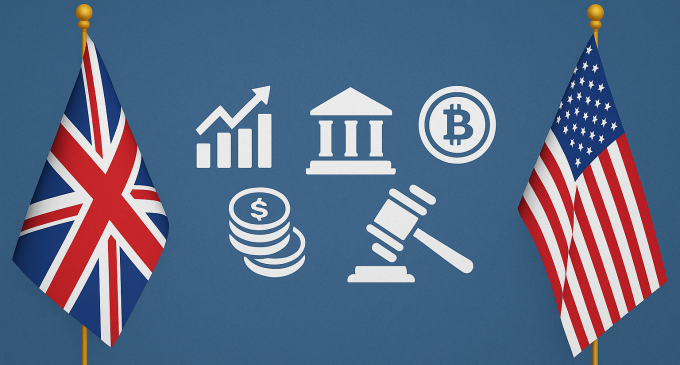
Introduction
The announcement that the United Kingdom and the United States are forming a joint task force to explore future markets, with a particular focus on capital markets and digital assets, represents a milestone moment in global financial governance. In an era where digital transformation, cryptocurrencies, decentralized finance, and tokenized assets are reshaping the foundations of global commerce, the decision by two of the world’s most influential financial powers to align their approaches sends a powerful signal. This collaboration reflects recognition of the need for transatlantic cooperation in building consistent, resilient, and forward-looking regulatory frameworks that can balance innovation with stability.
Background To The Joint Task Force
For more than a century, London and New York have served as twin pillars of global finance. The UK and US have often influenced the course of capital markets regulation through their distinct but sometimes complementary approaches. In recent years, the rapid emergence of digital assets, blockchain technology, and tokenized financial instruments has accelerated the pace of innovation, challenging traditional regulatory models. Central banks, securities regulators, and treasury departments have wrestled with questions surrounding investor protection, systemic risk, money laundering, taxation, and consumer confidence.
Against this backdrop, policymakers have recognized that fragmented regulatory strategies create loopholes and inefficiencies. Investors and companies operating in multiple jurisdictions face compliance uncertainty, while regulators struggle to address cross-border risks. The new joint task force between the UK and US is therefore intended to serve as a platform for dialogue, coordination, and potentially harmonized standards in areas such as digital asset classification, licensing, market conduct, and risk management.
Objectives Of The Task Force
The stated aim of the joint task force is to explore cooperation in the regulation of future markets, particularly capital markets modernization and digital asset oversight. Several specific objectives can be inferred from policy statements and expert commentary.
First, the task force will likely seek to enhance regulatory clarity for digital assets. Questions about whether certain tokens should be treated as securities, commodities, or entirely new asset classes have long complicated enforcement and compliance. By working together, the US Securities and Exchange Commission, the UK Financial Conduct Authority, and related agencies can seek convergent definitions and frameworks.
Second, the task force will attempt to address risks associated with decentralized finance and stablecoins. The collapse of high-profile crypto exchanges and stablecoin failures has underscored the need for stronger oversight. Coordinated guidelines on reserve backing, disclosure requirements, and audit standards would help safeguard financial stability.
Third, capital markets modernization is on the agenda. Beyond crypto, the task force may examine how technologies such as blockchain-based settlement, tokenized securities, and artificial intelligence can streamline processes, reduce costs, and improve transparency in traditional markets. By sharing research and pilot projects, the UK and US can accelerate innovation while protecting investors.
Significance For Capital Markets
Capital markets are the backbone of modern economies, facilitating investment, liquidity, and wealth creation. Yet traditional systems are under pressure from digital alternatives promising faster, cheaper, and more inclusive access. The joint task force recognizes that markets of the future will not simply replicate the past in digital form but will evolve toward hybrid systems where blockchain-enabled platforms coexist with established exchanges.
For example, tokenization of real assets such as real estate, commodities, or equities could broaden investor participation. A small investor might purchase fractionalized shares of a commercial building through a regulated token market. Likewise, automated clearing and settlement using distributed ledger technology could shorten settlement cycles, reduce counterparty risk, and lower transaction costs.
However, without consistent regulation, these innovations could fragment liquidity, invite fraud, or create systemic vulnerabilities. The UK and US task force therefore represents an attempt to preserve the integrity of capital markets while embracing technological transformation.
Implications For Digital Asset Regulation
Digital assets have grown from niche innovations to mainstream financial instruments within a decade. Cryptocurrencies such as Bitcoin and Ethereum attract billions in daily trading volume, while stablecoins and decentralized applications are increasingly used in payments, lending, and asset management. Yet the regulatory landscape remains inconsistent and contested.
The US has often adopted a cautious and enforcement-driven approach, with agencies like the SEC and CFTC asserting jurisdiction in overlapping ways. The UK has pursued a more flexible framework through the FCA, offering sandboxes and consultative processes while imposing stricter requirements on marketing and promotions. By bringing these perspectives together, the joint task force can identify best practices and reduce regulatory arbitrage.
Key questions to be addressed include how to classify tokens, what licensing regimes should apply to exchanges and wallet providers, how to implement anti-money laundering and counter-terrorism financing measures effectively, and how to protect retail investors from predatory practices. Cooperation between two major markets also increases the likelihood that standards set by the task force could influence global norms adopted by other jurisdictions.
Challenges Ahead
While the initiative is ambitious, it faces numerous challenges.
One challenge is the differing legal traditions and regulatory philosophies of the UK and US. The US tends to rely on rule-based enforcement and litigation, while the UK leans toward principles-based regulation with more flexibility. Reconciling these approaches will not be easy.
Another challenge lies in political dynamics. Regulatory priorities shift with administrations and governments, and bipartisan consensus in the US or political stability in the UK cannot always be assumed. Maintaining long-term momentum will require strong institutional commitment beyond electoral cycles.
Technology itself poses a challenge. The pace of innovation in blockchain and digital finance often outstrips the capacity of regulators to keep up. Concepts such as decentralized autonomous organizations, non-fungible tokens, or algorithmic stablecoins raise novel questions that existing laws may not easily address. Crafting adaptable and forward-looking frameworks without stifling innovation is a delicate balance.
Finally, global coordination remains incomplete. While UK-US cooperation is significant, other major markets such as the European Union, China, Japan, and emerging economies must also be part of the conversation. Divergent regulations could still lead to fragmentation and arbitrage.
Opportunities For Innovation And Leadership
Despite challenges, the joint task force presents opportunities for both countries to lead globally. By aligning standards, the UK and US can set benchmarks for transparency, investor protection, and technological integration. Their combined market influence can encourage adoption of best practices across jurisdictions.
This initiative also enhances investor confidence. Clearer rules reduce uncertainty, attract institutional capital, and encourage responsible innovation. Financial institutions that have hesitated to engage with digital assets may find greater comfort in a predictable regulatory environment.
Moreover, collaboration fosters innovation. Regulatory sandboxes, cross-border pilot projects, and knowledge sharing can accelerate the development of new products and services. Both London and New York could strengthen their positions as hubs for digital finance, complementing their historical dominance in traditional finance.
Potential Global Impact
The global significance of the UK-US joint task force cannot be overstated. Together, these two economies account for a substantial share of global capital markets and fintech activity. Their cooperation could inspire similar partnerships or multilateral initiatives, potentially leading to a more harmonized international framework.
For developing countries and smaller markets, alignment between the UK and US offers a reference model that can be adapted locally. Standardized definitions and disclosure requirements could reduce the compliance burden on multinational firms, while also making it easier for startups to access international capital.
Furthermore, global stability could benefit. Coordinated regulation reduces the risk of regulatory arbitrage where firms exploit gaps between jurisdictions. It also strengthens defenses against illicit finance, including money laundering and terrorist financing conducted through crypto channels.
Perspectives From Industry And Regulators
Industry stakeholders have broadly welcomed the announcement of the task force. Financial institutions view it as an opportunity to gain clarity, reduce compliance costs, and accelerate institutional adoption of digital assets. Technology firms see a chance to work with regulators in shaping innovative solutions.
Regulators emphasize the importance of investor protection and systemic stability. Both the FCA and SEC have faced criticism for either being too lenient or too harsh, and joint collaboration provides a chance to strike a more balanced approach. Meanwhile, academics and think tanks stress the need for adaptive regulation that can evolve with technological change rather than relying solely on rigid rules.
The Road Ahead
The success of the joint task force will depend on several factors. Sustained political will, effective communication between agencies, stakeholder engagement, and adaptability to rapid technological change are all essential. Early deliverables might include joint reports, shared definitions, pilot projects, or memoranda of understanding. Over time, more ambitious outcomes such as mutual recognition of licenses, joint enforcement actions, or harmonized disclosure standards could emerge.
The task force may also pave the way for broader international dialogue. Institutions such as the G7, G20, IMF, and BIS could incorporate lessons from the UK-US initiative into global discussions on digital finance. In this sense, the bilateral task force could become a catalyst for multilateral progress.
Conclusion
The creation of a joint UK-US task force on capital markets and digital assets regulation marks an important step in shaping the future of global finance. By aligning two of the world’s most influential financial centers, the initiative aims to provide clarity, stability, and innovation in markets undergoing rapid transformation. While challenges remain, the opportunities for leadership, investor confidence, and global influence are immense.
As digital assets continue to evolve from speculative instruments to integral components of the financial ecosystem, the role of thoughtful, coordinated regulation will only grow in importance. The UK and US have an opportunity to set the tone for how markets of the future will function, balancing technological possibility with the timeless principles of trust, transparency, and fairness.







There are no comments at the moment, do you want to add one?
Write a comment